|
|
|
Sort Order |
|
|
|
Items / Page
|
|
|
|
|
|
|
| Srl | Item |
| 1 |
ID:
132327
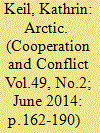

|
|
|
|
|
| Publication |
2014.
|
| Summary/Abstract |
Neorealist and neoliberal institutionalist explanations for the state and future of the Arctic region dominate the Arctic debate in international relations. While both schools focus on different aspects concerning the current and future state of Arctic affairs - neorealism evokes a confrontational rush for the Arctic's resources, whereas neoliberal institutionalism propagates the necessary reform of the institutional system governing Arctic issues - both share the underlying assumption of significant and rising stakes towards Arctic commodities. However, this article argues that this debate has hitherto failed to substantiate the actual stakes of the main actors involved. Consequently, many studies make grandiloquent statements about prospects of cooperation and conflict and the appropriate institutional framework for the Arctic region, based on only limited empirical support. This article aims to fill this gap by analysing the Arctic oil and gas interests of the five Arctic littoral states (Russia, USA, Canada, Norway and Denmark/Greenland). The analysis shows greatly different levels of interests towards the High North among the Arctic states. The findings make it possible to make more credible statements about the likelihood of confrontation over Arctic resources and necessary institutional adjustments. The evidence shows that the often-evoked issue of geopolitical rush for Arctic resources is unlikely to eventuate. Nonetheless, there remain institutional challenges for the protection of the fragile Arctic ecosystem.
|
|
|
|
|
|
|
|
|
|
|
|
|
|
|
|
| 2 |
ID:
077278
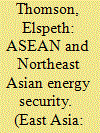

|
|
|
| 3 |
ID:
104228


|
|
|
|
|
| Summary/Abstract |
Non-traditional security issues such as energy security have been becoming more and more important in Asia and worldwide in recent years. It is increasingly difficult for a single country to guarantee its energy security in the globalized world of today. Asian countries have made some progress in bilateral and multilateral dialogues to promote cooperation and coordination in the energy field. However, they are still far from establishing a regional architecture of energy security. The Asian countries must therefore make greater efforts to realize a regional mechanism of energy cooperation. In the future, there should be a multi-level (regional, sub-regional, and trans-regional, and bilateral), multi-channel, and multi-model Asian regional architecture of energy security.
|
|
|
|
|
|
|
|
|
|
|
|
|
|
|
|
| 4 |
ID:
104229
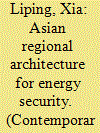

|
|
|
|
|
| Summary/Abstract |
Non-traditional security issues such as energy security have been becoming more and more important in Asia and worldwide in recent years. It is increasingly difficult for a single country to guarantee its energy security in the globalized world of today. Asian countries have made some progress in bilateral and multilateral dialogues to promote cooperation and coordination in the energy field. However, they are still far from establishing a regional architecture of energy security. The Asian countries must therefore make greater efforts to realize a regional mechanism of energy cooperation. In the future, there should be a multi-level (regional, sub-regional, and trans-regional, and bilateral), multi-channel, and multi-model Asian regional architecture of energy security.
|
|
|
|
|
|
|
|
|
|
|
|
|
|
|
|
| 5 |
ID:
104230
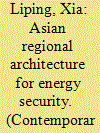

|
|
|
|
|
| Publication |
2011.
|
| Summary/Abstract |
Non-traditional security issues such as energy security have been becoming more and more important in Asia and worldwide in recent years. It is increasingly difficult for a single country to guarantee its energy security in the globalized world of today. Asian countries have made some progress in bilateral and multilateral dialogues to promote cooperation and coordination in the energy field. However, they are still far from establishing a regional architecture of energy security. The Asian countries must therefore make greater efforts to realize a regional mechanism of energy cooperation. In the future, there should be a multi-level (regional, sub-regional, and trans-regional, and bilateral), multi-channel, and multi-model Asian regional architecture of energy security.
|
|
|
|
|
|
|
|
|
|
|
|
|
|
|
|
| 6 |
ID:
081484
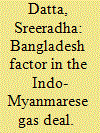

|
|
|
|
|
| Publication |
2008.
|
| Summary/Abstract |
With the discovery of substantial gas in Myanmar's Sittwe region in the Rakhine state, India was keen to acquire gas from some of the new finds in the Shwe gas field, divided in several blocks, of which A-1 and A-2 blocks were closer to India and also estimated to have the best recoverable reserves. Given the geographical location, overland pipelines transiting through Bangladesh are the most cost-effective way of getting gas from Myanmar to India. Despite its initial enthusiasm, Bangladesh backtracked from its earlier willingness to be a partner to the tripartite pipeline. Dhaka tied its support for the project to India accepting its many existing demands in other area. The domestic opposition in Bangladesh delayed the finalising of the pipeline routes-one of the main reasons that eventually led to other countries walking away with the contract of the A-1 block
|
|
|
|
|
|
|
|
|
|
|
|
|
|
|
|
| 7 |
ID:
132382
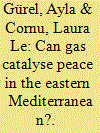

|
|
|
|
|
| Publication |
2014.
|
| Summary/Abstract |
The economic rationale for energy collaboration between Turkey, Cyprus and Israel is compelling. Cyprus and Israel need commercially viable export routes for their gas while Turkey is eager to diversify and increase its gas supplies. Hydrocarbon resources could potentially be a catalyst for both bringing about a Cyprus settlement and a Turkey-Israel rapprochement. A trilateral cooperation scheme involving a Turkey-Israel pipeline and an LNG plant in Cyprus could offer strong commercial incentives to all parties. But it would require bold political vision on the part of the region's leaders, coupled with backing from influential external actors with an interest in reconciliation and stability in the Eastern Mediterranean.
|
|
|
|
|
|
|
|
|
|
|
|
|
|
|
|
| 8 |
ID:
103691
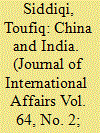

|
|
|
| 9 |
ID:
082848
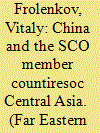

|
|
|
|
|
| Publication |
2008.
|
| Summary/Abstract |
The Shanghai Cooperation Organization (SCO) is gradually intensifying its focus on economics. The most likely explanation for this policy change is that China, the SCO's economic growth engine, needs lots of fuel to stay in the running, and this change of the Organization's thrust is fully supported by Central Asia and Russia with their abundant hydrocarbons.1 Significantly, experts must be right, we believe, arguing that the SCO may turn out to be short-lived as a regional alliance unless its members found common ground on energy from both the economic and political, even strategic, perspective
|
|
|
|
|
|
|
|
|
|
|
|
|
|
|
|
| 10 |
ID:
068454


|
|
|
| 11 |
ID:
179742
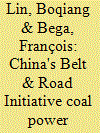

|
|
|
|
|
| Summary/Abstract |
Energy cooperation is a major part of China's Belt & Road Initiative (BRI). In particular, power generation projects play a significant role, especially coal power projects. In spite of its substantial impacts on China and the world, research on the BRI coal power projects is scarce. To provide a better picture of the BRI coal power cooperation, we analyze the evolutions, rationales, challenges, and prospects. Our finding reveals that the BRI coal power projects generate opportunity for the BRI participants, as coal energy can render electricity generation more efficient in these countries, mostly from developing world, with larger and cleaner plants, providing flexibility for greater integration of renewables. However, given sustainability concerns regarding coal power, our article suggests that the transition toward low-carbon energy systems should be pursued in the long-term with more focus on promoting innovations in energy efficiency, energy storage, and cleaner energies like gas, wind, and solar.
|
|
|
|
|
|
|
|
|
|
|
|
|
|
|
|
| 12 |
ID:
176819


|
|
|
|
|
| Summary/Abstract |
Civil nuclear cooperation is a part of China's Belt & Road Initiative (BRI). Although the complex nature of nuclear technology and scale of the BRI program are likely to have substantial influences on the global nuclear landscape, research regarding the BRI nuclear cooperation is scarce. Given that paucity, our article aims at providing a fuller understanding of the program and policy implications. Distinctive parts include the BRI's economic dirigisme and new norms reflected to this nuclear cooperation, which draw a range of implications to the global nuclear future. Noting that the value of “win-win” is at the center of the BRI, this research highlights the need for a practical approach in the BRI nuclear cooperation and more emphasis on renewable energies. The roles of international community and regulators in the changing global nuclear market are also discussed.
|
|
|
|
|
|
|
|
|
|
|
|
|
|
|
|
| 13 |
ID:
077750


|
|
|
|
|
| Publication |
2007.
|
| Summary/Abstract |
This study gives a long-term energy outlook for China by an econometric method. China's GDP growth will be 6.4 percent annually from 2005 to 2030, and the continuation of rapid economic growth could result in a number of difficult issues such as energy security, environment protection and CO2 emissions reductions. China should solve these problems through its own efforts. At the same time, international cooperation such as establishing an Energy Community in the Northeast Asia region is also an important strategic option
|
|
|
|
|
|
|
|
|
|
|
|
|
|
|
|
| 14 |
ID:
181651


|
|
|
|
|
| Publication |
Oxon, Routledge, 2022.
|
| Description |
xxvi, 299p.: figures, tableshbk
|
| Series |
Routledge Critical Perspectives on India and China; 03
|
| Standard Number |
9781032187495
|
|
|
|
|
|
|
|
|
|
|
|
Copies: C:1/I:0,R:0,Q:0
Circulation
| Accession# | Call# | Current Location | Status | Policy | Location |
| 060083 | 333.790954/BHA 060083 | Main | On Shelf | General | |
|
|
|
|
| 15 |
ID:
158318


|
|
|
|
|
| Publication |
Dhaka, Institute for Policy, Advocacy and Governance, 2017.
|
| Description |
xvi, 272p.hbk
|
| Standard Number |
9789843429247
|
|
|
|
|
|
|
|
|
|
|
|
Copies: C:1/I:0,R:0,Q:0
Circulation
| Accession# | Call# | Current Location | Status | Policy | Location |
| 059367 | 382.4/DHA 059367 | Main | On Shelf | General | |
|
|
|
|
| 16 |
ID:
082586


|
|
|
| 17 |
ID:
067016
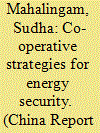

|
|
|
| 18 |
ID:
132908


|
|
|
|
|
| Publication |
2014.
|
| Summary/Abstract |
Promotion of renewable energy and application of clean technology are essential for limiting emissions of GHG and facilitating environmentally compatible development. Although India and the European Union (EU) recognise their vulnerability to climate change, they differ on their 'normative claims' of the global climate change regime. India and the EU do not agree on emission cut targets. They can cooperate in multiple ways in the areas of clean technologies, renewable energy, research and development and sharing knowledge for sustainable development planning, etc. India has adopted a comprehensive National Action Plan on Climate Change (NAPCC), which comprises of both mitigation and adaptation measures to climate change. The implementation of the NPACC would be crucial in shaping a policy for inclusive and sustainable development. Hence, cooperation between India and the EU can take place in areas of the NAPCC that would help not only in coping with climate change, but also in enhancing India's economic relations as well as development partnership with the EU.
|
|
|
|
|
|
|
|
|
|
|
|
|
|
|
|
| 19 |
ID:
099974
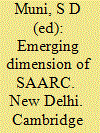

|
|
|
|
|
| Publication |
New Delhi, Cambridge University Press, 2010.
|
| Description |
vi, 322p.
|
| Standard Number |
9788175967458, hbk
|
|
|
|
|
|
|
|
|
|
|
|
Copies: C:1/I:0,R:0,Q:0
Circulation
| Accession# | Call# | Current Location | Status | Policy | Location |
| 055457 | 337.54/MUN 055457 | Main | On Shelf | General | |
|
|
|
|
| 20 |
ID:
064440


|
|
|
|
|
|
|
|